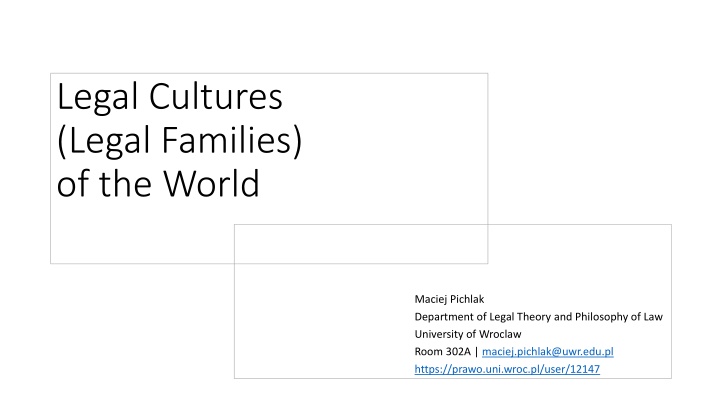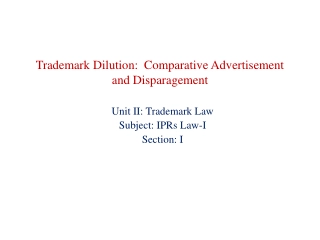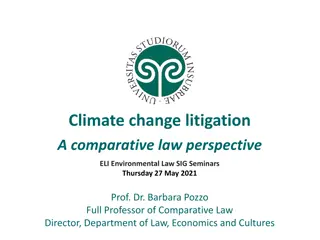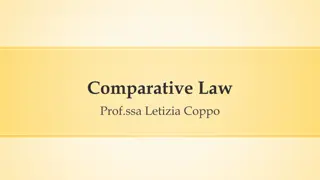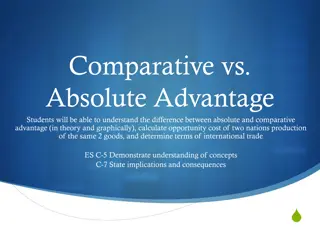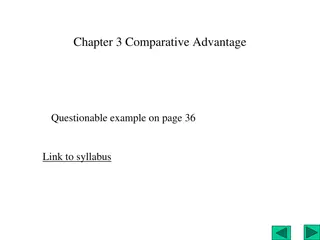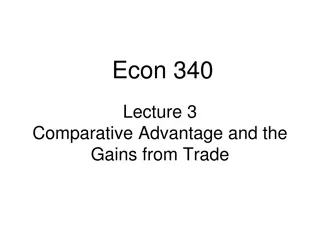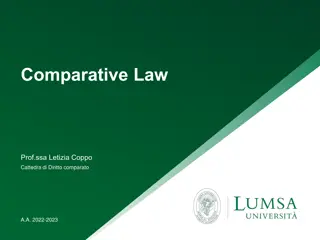Comparative Analysis of Legal Families Around the World
Explore the diverse legal cultures and families existing globally, including Civil Law, Common Law, Far East, Islamic, Hindu, and more. Learn about the historical background, methods of reasoning, institutions, sources of law, and dominant ideologies that characterize each legal family. Delve into the differences between Civil Law and Common Law systems, their origins, development, and unique features. Gain insight into the criteria for distinguishing legal families and the role of judges in Common Law and Civil Law jurisdictions.
Download Presentation

Please find below an Image/Link to download the presentation.
The content on the website is provided AS IS for your information and personal use only. It may not be sold, licensed, or shared on other websites without obtaining consent from the author.If you encounter any issues during the download, it is possible that the publisher has removed the file from their server.
You are allowed to download the files provided on this website for personal or commercial use, subject to the condition that they are used lawfully. All files are the property of their respective owners.
The content on the website is provided AS IS for your information and personal use only. It may not be sold, licensed, or shared on other websites without obtaining consent from the author.
E N D
Presentation Transcript
Legal Cultures (Legal Families) of the World Maciej Pichlak Department of Legal Theory and Philosophy of Law University of Wroclaw Room 302A | maciej.pichlak@uwr.edu.pl https://prawo.uni.wroc.pl/user/12147
Main legal families Civil law (Romano-Germanic) Common law (Anglo-American) Far East Islamic Hindu Scandinavian [Post-soviet]
The concept of legal family Criteria for distinguishing legal family (Koetz and Zweigert): Historical background; Methods of reasoning; Institutions; Sources of law; Dominant ideology. Other possibilities: language; territory; political system
Civil law vs. common law Source: www.frenchentree.com
Civil law Originates from the continental Europe Based on the reception of the Roman law Legislation is the primary source of law Codifications (Code of Napoleon, BGB) Similar methods of legal reasoning and interpretation Abstract, systematic; the role of legal doctrine
Civil law: Germanic vs. Romanistic Tradition 756779 http://commons.wikimedia.org/w/index.php?curid=26 Source: By Ain92 - Own work, CC BY-SA 3.0, Germanic Romanistic Nordic Mixed Common law
1900 1811 1804
Common law Originates from England, adopted in its (former) colonies Embraces legislation, regulations and judge-made law (precedents: common law in a strict sense) Precedents might be based on common law or equity Developed independently, without reception of the Roman law Less codified and systematized More casuistic and practically-oriented
Common law and civil law: further differences The role of judges The Rule of Law vs. Rechtsstaat Separation of powers vs. check and balance Models of judicial constitutional control
Religious and traditional laws Islamic law (Sharia and Fiqh), Hindu law (India), Halakha (Israel) Distinct from the western idea of law No clear separation of legal, religious, or moral standards In contemporary legal systems their status varies
Islamic law Sharia (rules) and Fiqh (jurisprudence) Sources of sharia: Quran and Sunnah Spheres of regulation: Religious obligations Family law Economic laws Criminal laws Dietary, hygiene, dress code etc.
Application of sharia 5568 https://commons.wikimedia.org/w/index.php?curid=2474 Source: - none; - Muslim s personal law - full; - others
Legal system of India vs. Hindu law India is a federal state and laws may vary from one state to another The legal system of India is called a hybrid system and includes: Common law Civil law (mainly on Goa) Various personal laws, according to ethnicity and religion (Hindu law, Muslim s law, Christian law)
Hindu law A post-colonial term; the more proper one is Dharma Group of customs and traditional standards Regarded to be the oldest jurisprudential system in the world Based on a caste system To some extent recognized by formal legal system and Indian courts Relates mainly to personal laws, family (marrital) laws, some private contracts
Legal systems of Far East Most relevant: Chinese law, Japanese law Contemporarily usually a mixture: of western law and traditional customary law (Japan); of western law and socialist law (China). Said to be more focused on harmony than justice, reconciliation than adjudication. Less litigatory than in the so called Western world.
Legal system of China Civil law (Mainland) Common law (Hong Kong) Socialist law Tradition? (confucianism, legalists)
China: Traditions of legal thought Confucius: The idea of harmony and hierarchy Li: traditional morality and customs, internalized by human nature Less reliance in external regulations and sanctions Legalists: All people are equal Neccessity of codification and strict punishment Law is an external measure to secure social order Stress on legalism and obeying the laws
